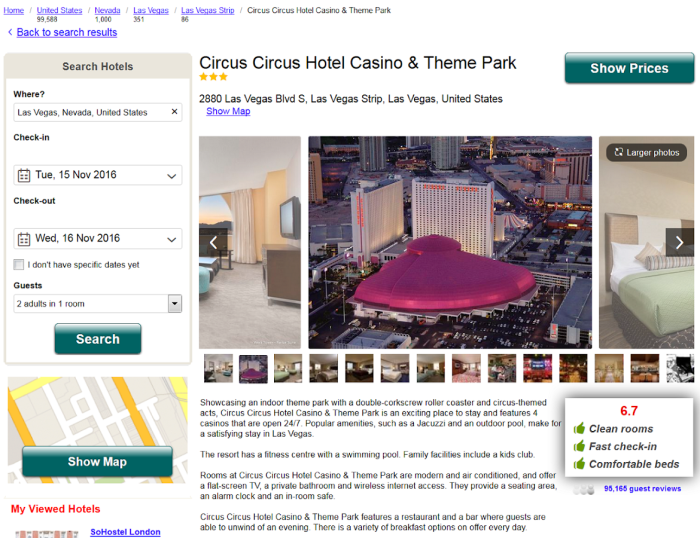
How to find hotel deals is a question on many travelers’ minds. Securing affordable accommodations can significantly impact the overall budget of a trip, transforming a potentially stressful experience into a relaxing and enjoyable one. This guide delves into various strategies, from leveraging online booking platforms and loyalty programs to negotiating directly with hotels and exploring budget-friendly alternatives. We’ll explore the best ways to find the perfect hotel at the perfect price, ensuring your next vacation is both memorable and financially responsible.
From understanding the intricacies of online booking engines and mastering the art of negotiation to capitalizing on seasonal fluctuations and discovering hidden gems, this comprehensive guide equips you with the knowledge and tools to navigate the world of hotel bookings with confidence. Whether you’re a seasoned traveler or embarking on your first adventure, mastering the art of finding hotel deals is key to unlocking unforgettable experiences without breaking the bank.
Finding the Best Hotel Deals Online
Securing the best hotel deals requires a strategic approach, combining knowledge of various booking platforms with smart search techniques. Understanding the strengths and weaknesses of different websites, and mastering advanced search filters, can significantly reduce your accommodation costs. This section will equip you with the tools and knowledge to find exceptional hotel deals.
Comparison of Major Hotel Booking Websites
Choosing the right booking website can significantly impact the final price and overall experience. The following table compares five major players, highlighting their key features and differentiating factors.
| Website | Price Comparison Features | User Interface Rating (1-5, 5 being best) | Unique Selling Points |
|---|---|---|---|
| Booking.com | Extensive inventory, price calendar, filter options for amenities, guest ratings | 4 | Wide selection, detailed property information, good customer support |
| Expedia | Price comparison across hotels, flights, and car rentals, package deals | 4 | Bundled travel options, rewards program, extensive travel resources |
| Hotels.com | Price comparison, rewards program (free night after 10 stays) | 3 | Rewards program incentivizes repeat bookings, simple interface |
| Kayak | Metasearch engine comparing prices from multiple sources, price alerts | 5 | Excellent price comparison across many sites, clear and concise display |
| Priceline | Name your own price option (Express Deals), package deals | 3 | Potential for significant savings with Express Deals, but less control over hotel selection |
Strategies for Finding Hidden Hotel Deals Using Advanced Search Filters
Advanced search filters are invaluable tools for uncovering hidden deals. By utilizing these features effectively, you can refine your search to find hotels that perfectly match your needs and budget.
Here are three strategies to employ:
- Flexible Dates: Instead of searching for specific dates, try expanding your search window. Often, prices fluctuate significantly depending on the day of the week or time of year. Experimenting with slightly earlier or later dates can reveal substantial savings. For example, a mid-week stay might be considerably cheaper than a weekend stay.
- Sort by Price: Always sort your search results by price, from lowest to highest. This prioritizes the most affordable options and allows you to quickly identify potential bargains. Don’t be afraid to explore hotels slightly further from your preferred location if it means significant cost savings.
- Utilize Amenity Filters: Many booking sites allow you to filter results based on specific amenities, such as free Wi-Fi, free breakfast, or parking. By carefully selecting your desired amenities, you can narrow your search to hotels that offer greater value for your money. For instance, if free breakfast is important to you, filtering your search to include this amenity can offset the cost of some meals.
Benefits and Drawbacks of Using Price Comparison Websites
Price comparison websites offer a convenient way to compare hotel prices across multiple booking platforms simultaneously. However, it’s important to weigh the benefits against potential drawbacks.
Advantages include:
- Time Savings: Quickly compare prices from various sources without visiting each website individually.
- Unbiased Comparison: Provides a neutral overview of prices, helping you identify the best deals.
- Access to Hidden Deals: May uncover deals not easily found through direct booking.
Disadvantages include:
- Potential for Inaccurate Information: Prices can change rapidly, and some websites may not always display the most up-to-date information.
- Lack of Direct Customer Support: If you encounter issues, you may need to contact the individual booking website for assistance.
- Limited Control Over Booking Process: You are redirected to the individual booking site to complete the reservation.
Utilizing Hotel Loyalty Programs and Rewards
Hotel loyalty programs offer a compelling way to reduce travel costs and enhance your hotel experience. By strategically participating in these programs, you can accumulate points or earn status, unlocking benefits such as free nights, room upgrades, and priority services. However, it’s crucial to understand both the advantages and disadvantages before committing to multiple programs.
Advantages and Disadvantages of Hotel Loyalty Programs
Joining a hotel loyalty program presents several benefits, including the accumulation of points redeemable for free stays or upgrades, priority check-in and checkout, complimentary amenities (like Wi-Fi or breakfast), and potential access to exclusive member rates. However, there are also drawbacks. Focusing your loyalty on a single program might limit your choices when booking hotels, and earning enough points for a significant reward can sometimes require extensive travel.
Furthermore, the value of points can fluctuate, and program rules and benefits can change without much notice. Careful consideration of these factors is crucial before deciding which programs, if any, to join.
Comparison of Top Hotel Loyalty Programs
Choosing the right loyalty program depends on your travel habits and preferences. The following table compares three major programs: Marriott Bonvoy, Hilton Honors, and IHG One Rewards.
| Program | Reward Structure | Eligibility Requirements |
|---|---|---|
| Marriott Bonvoy | Points earned per dollar spent vary by hotel and booking type; points can be redeemed for free nights, upgrades, and experiences. Elite status offers benefits like free breakfast and late checkout. | Free to join; earn points by staying at Marriott hotels and participating partners. |
| Hilton Honors | Points earned per dollar spent vary by hotel and booking type; points can be redeemed for free nights, upgrades, and experiences. Elite status offers benefits like free breakfast, lounge access, and upgrades. | Free to join; earn points by staying at Hilton hotels and participating partners. |
| IHG One Rewards | Points earned per dollar spent vary by hotel and booking type; points can be redeemed for free nights, upgrades, and experiences. Elite status offers benefits like free breakfast, late checkout, and bonus points. | Free to join; earn points by staying at IHG hotels and participating partners. |
Maximizing Points and Rewards
Several strategies can help maximize your points and rewards within hotel loyalty programs. Using a hotel’s co-branded credit card can offer bonus points on spending, while booking directly through the hotel website often yields more points than booking through third-party sites. Taking advantage of bonus point promotions, such as those offered for specific stays or during certain times of the year, can significantly boost your rewards.
Finally, consider utilizing points for free nights during off-peak seasons or less popular destinations to maximize the value of your accumulated points. For example, redeeming 25,000 points for a free night in a smaller city might be more valuable than using the same points for a night in a high-demand location.
Redeeming Points for Free Nights or Upgrades, How to find hotel deals
Redeeming accumulated points for free nights or upgrades is generally straightforward. Most programs have online portals where you can browse available rewards and make reservations. You will typically need a sufficient number of points based on the hotel’s category and the dates of your stay. The process usually involves selecting your desired dates and location, checking point availability, and completing the booking process.
Upgrades are often available at the time of booking or during check-in, subject to availability. It’s always advisable to check the specific program’s terms and conditions for detailed information on point redemption and upgrade policies.
Negotiating Hotel Rates Directly
Negotiating directly with hotels can unlock significant savings, especially for longer stays or during periods of lower occupancy. While online booking platforms offer convenience, contacting the hotel directly empowers you to leverage specific circumstances and potentially secure better deals than advertised. This approach requires a polite but firm demeanor and a well-prepared strategy.
Successfully negotiating hotel rates requires a strategic approach, combining persuasive arguments with a clear understanding of your needs and the hotel’s potential incentives. Remember, the hotel is more likely to negotiate when occupancy is low or when they are aiming to fill specific room types. Always maintain a respectful and professional tone throughout your communication.
Effective Negotiation Strategies
Three effective strategies for negotiating lower hotel rates involve highlighting your value as a guest, leveraging competitive offers, and demonstrating flexibility with your travel plans. These strategies increase your chances of success by appealing to the hotel’s bottom line and their desire to secure bookings.
- Highlight Your Value: Emphasize your potential to generate repeat business or recommend the hotel to others. For example, you could mention that you’re planning a longer stay, are a frequent traveler, or are a member of a professional organization that often books accommodations for its members.
- Leverage Competitive Offers: If you’ve found a lower rate at a competitor hotel, politely mention it to the hotel you’re contacting. This doesn’t guarantee a price match, but it puts pressure on them to offer a competitive rate. For instance, you could say, “I found a similar room at [Competitor Hotel] for [Price], and I was hoping you could match or beat that offer.”
- Demonstrate Flexibility: Offering flexibility with your dates or room type can significantly improve your chances of negotiation. If your dates are flexible, state this clearly and indicate your willingness to consider alternative dates with lower rates. Similarly, expressing openness to a slightly different room type (e.g., a standard room instead of a suite) can also increase your negotiating power.
For example: “While I prefer a suite, I’m open to a standard room if it helps lower the cost.”
Compelling Negotiation Arguments
Presenting compelling arguments increases the likelihood of a successful negotiation. These arguments should focus on the mutual benefit of the transaction, emphasizing your value to the hotel and your willingness to compromise.
- Long-term Stay Discount: “I’m planning a [number]-night stay, and I was hoping you could offer a discounted rate for extended stays.”
- Corporate Rate Inquiry: “I’m traveling on business for [Company Name], and I was wondering if you offer any corporate rates.”
- Off-Season/Weekday Rate Request: “I understand this is the off-season/weekday, and I’m hoping you might have a lower rate available for these dates.”
Situations Favoring Direct Negotiation
Direct negotiation is most effective under specific circumstances that provide leverage for the guest. These situations often involve factors that influence the hotel’s occupancy and revenue goals.
- Low Occupancy Periods: Hotels are more likely to negotiate during off-peak seasons or weekdays when occupancy is low. They are incentivized to fill rooms at any rate above their operating costs.
- Last-Minute Bookings: While not always guaranteed, last-minute bookings can sometimes result in negotiated rates, as hotels would rather fill a vacant room than leave it empty. However, be prepared to accept a potentially less desirable room type.
- Extended Stays: Hotels often offer discounted rates for extended stays (7+ nights) to secure long-term bookings and increase revenue predictability.
Finding Hotel Deals During Off-Season and Weekdays

Securing affordable hotel accommodations often hinges on strategic timing. By understanding seasonal fluctuations and weekday versus weekend pricing, travelers can significantly reduce their lodging expenses. This section will explore the advantages of booking during off-season periods and on weekdays.Off-season travel offers a compelling opportunity to save money and enjoy a more relaxed travel experience. Peak seasons, driven by popular holidays and favorable weather conditions, typically command higher prices due to increased demand.
Conversely, off-season periods see a drop in demand, leading to lower prices and greater availability.
Off-Season Periods for Popular Destinations
Identifying the off-season for a specific destination is crucial for maximizing savings. The off-season generally corresponds to periods of less favorable weather or lower tourist activity. For instance, many European destinations experience their off-season during the winter months, while tropical locations may have theirs during the hurricane season or the hottest months of the year. Similarly, popular domestic destinations will have periods of lower demand based on local weather patterns and school calendars.
Peak Season vs. Off-Season Hotel Price Comparison
To illustrate the price differences, let’s consider three popular destinations: Orlando, Florida; Paris, France; and Cancun, Mexico. The following table presents a hypothetical comparison of average hotel prices during peak and off-season periods, based on typical rates for a standard double room in a mid-range hotel. Note that these are illustrative examples and actual prices can vary greatly depending on the specific hotel, booking platform, and time of year.
| Destination | Peak Season (Average Price) | Off-Season (Average Price) | Price Difference |
|---|---|---|---|
| Orlando, Florida (July) | $250 | $125 | $125 (50%) |
| Paris, France (August) | $300 | $150 | $150 (50%) |
| Cancun, Mexico (September) | $200 | $100 | $100 (50%) |
Weekday vs. Weekend Hotel Pricing
Booking a hotel room mid-week (Sunday through Thursday) often results in lower prices than booking for a weekend stay (Friday and Saturday). This is because hotels experience higher demand during weekends due to leisure travelers and business trips that often span the weekend. The reduced demand during weekdays allows hotels to offer lower rates to fill their rooms. The savings can be substantial, particularly in popular tourist destinations.
Budget-Friendly Hotel Alternatives
Exploring alternatives to traditional hotels can significantly reduce travel expenses without sacrificing comfort or experience. This section compares various budget-friendly options, helping you choose the best fit for your travel style and budget. Consider factors like your desired level of privacy, access to amenities, and the overall social atmosphere when making your decision.
Comparison of Budget Accommodation Types
Choosing the right budget accommodation depends on your priorities. Below is a comparison of hostels, guesthouses, and budget hotels, highlighting their price ranges, amenities, and typical clientele.
| Accommodation Type | Average Price Range (USD per night) | Amenities | Target Traveler |
|---|---|---|---|
| Hostel | $20 – $50 | Dormitory-style rooms (shared or private options available), common areas, often kitchens, sometimes Wi-Fi included. | Budget-conscious solo travelers, backpackers, and young adults seeking a social atmosphere. |
| Guesthouse | $50 – $150 | Private rooms, often with en-suite bathrooms, sometimes includes breakfast, may have limited common areas. | Couples, families, or solo travelers seeking more privacy and comfort than a hostel but at a lower cost than a hotel. |
| Budget Hotel | $75 – $150+ | Private rooms, en-suite bathrooms, basic amenities (TV, Wi-Fi), may offer breakfast or other services. | Budget-conscious travelers seeking a balance between affordability and convenience; a step up from guesthouses. |
Websites Specializing in Budget Accommodations
Several websites specialize in listing budget-friendly accommodations worldwide. These platforms often offer detailed reviews, photos, and booking options, making it easy to compare prices and features. Examples include Hostelworld (for hostels), Booking.com (for a wider range, including guesthouses and budget hotels), and Airbnb (for a variety of options, including private rooms and entire apartments).
Finding Affordable Accommodation Near Tourist Attractions
Securing affordable lodging near popular attractions often requires strategic planning and flexibility. Consider staying slightly outside the immediate tourist center, using public transportation to reach attractions. Websites often allow filtering by proximity to landmarks, enabling you to identify budget-friendly options within a reasonable distance. Booking accommodations well in advance, especially during peak seasons, can also help secure better rates.
Furthermore, utilizing off-season travel or opting for mid-week stays often results in lower prices.
Flight Deals and Hacks
Securing affordable flights can significantly impact your overall travel budget. By employing effective strategies and utilizing available tools, you can substantially reduce your airfare costs. This section Artikels practical techniques for finding and booking the best flight deals.Finding the lowest airfare often requires a combination of smart searching, flexible planning, and a bit of luck. Understanding how flight prices fluctuate and leveraging online tools are key components of this process.
Using Flight Comparison Websites Effectively
Flight comparison websites aggregate flight data from numerous airlines and travel agencies, allowing you to quickly compare prices and options. To maximize their effectiveness, follow these steps:
- Be Specific with Your Search: Input precise travel dates, departure and arrival airports, and the number of passengers. Inaccurate information can lead to misleading results.
- Utilize Advanced Search Filters: Most websites offer advanced filters to refine your search based on factors such as airline preference, number of stops, and baggage allowance. Experiment with these filters to find the best fit for your needs.
- Check Multiple Websites: Don’t rely on just one comparison website. Different sites may display different prices due to varying agreements with airlines and agencies. Compare results across several popular sites like Google Flights, Skyscanner, Kayak, and Expedia.
- Browse Incognito Mode: Airlines and travel agencies sometimes track your searches and adjust prices based on your browsing history. Using incognito mode prevents this tracking, potentially revealing lower prices.
- Set Price Alerts: Many websites allow you to set up price alerts that notify you of price changes for specific flights. This allows you to monitor fluctuations and book when prices drop.
Benefits of Flexible Travel Dates and Alternative Airports
Rigidity in travel dates often leads to higher airfare. Consider shifting your travel dates by a day or two, or even a week, to potentially access significantly lower prices. Similarly, exploring nearby airports can uncover cheaper options.
For example, flying into a smaller airport outside a major city might offer lower fares, although it may require additional ground transportation. Consider the overall cost – including transportation to your final destination – when making this decision. Flexibility in your travel plans significantly increases your chances of finding budget-friendly flights.
Finding Last-Minute Flight Deals
While generally less predictable, last-minute flight deals can sometimes yield surprising savings. However, success requires quick action and adaptability.
Several strategies can increase your chances of finding last-minute deals. These include monitoring flight comparison websites frequently, being flexible with your destination, and considering less popular travel times. Airlines often release last-minute discounted seats to fill empty planes. Websites specializing in last-minute deals can also be helpful, but always compare prices with broader search engines to ensure you’re getting the best possible deal.
Remember that availability is limited, so quick decision-making is crucial.
Train Travel Guides
Train travel offers a unique alternative to air travel, often providing scenic routes and a more relaxed journey. While air travel prioritizes speed, trains can be surprisingly competitive in terms of time, especially for shorter to medium distances, and often offer a more comfortable experience, particularly for longer trips. This section will compare train and air travel, provide resources for booking tickets, and discuss the advantages and disadvantages of different train classes.
Train Versus Air Travel: Cost and Time Comparisons
The cost and travel time of train versus air travel vary significantly depending on the route, time of year, and specific booking. To illustrate, let’s compare three example routes: New York City to Boston, Chicago to Milwaukee, and Los Angeles to San Francisco. The data presented below is approximate and may vary based on the specific dates and booking platform used.
These examples are for illustrative purposes only and should not be considered definitive.
| Route | Train Travel Time (approx.) | Train Ticket Price (approx.) | Air Travel Time (approx.) | Air Ticket Price (approx.) |
|---|---|---|---|---|
| New York City to Boston | 3-4 hours | $50-$150 | 1 hour (flight time) + travel to/from airports | $75-$250 |
| Chicago to Milwaukee | 1.5-2 hours | $30-$80 | 1 hour (flight time) + travel to/from airports | $100-$300 |
| Los Angeles to San Francisco | 11-12 hours | $100-$300 | 1.5 hours (flight time) + travel to/from airports | $75-$250 |
Websites and Apps for Booking Train Tickets
Several websites and apps facilitate the booking of train tickets. Choosing the right platform can impact price and convenience. Factors such as route coverage, ease of use, and customer service should be considered when selecting a booking platform.
Some popular options include:
- Trainline: A widely used platform offering train tickets across many countries.
- Rail Europe: Specializes in European train travel.
- Amtrak (for US travel): The primary passenger railroad service in the United States.
- National rail websites (e.g., SNCF in France, Deutsche Bahn in Germany): Often offer the best prices and route options within their respective countries.
Train Class Comparison: Advantages and Disadvantages
Different train classes offer varying levels of comfort and amenities. The choice depends on individual preferences and budget.
A comparison of first and second class might include:
- First Class: Typically offers more spacious seating, enhanced legroom, complimentary food and beverages, access to lounges, and potentially better Wi-Fi. The disadvantage is the significantly higher cost.
- Second Class: Offers standard seating and amenities. While less luxurious, it’s considerably more affordable. Depending on the route and train operator, second class can still provide a comfortable and enjoyable journey.
Cruise Ship Reviews: How To Find Hotel Deals

Choosing a cruise can feel overwhelming with so many options available. This section compares three popular cruise lines, focusing on their value proposition to help you make an informed decision. We’ll also cover typical cruise costs and strategies for securing the best deals.
Cruise Line Comparison: Value for Money
Understanding the differences in amenities and pricing across various cruise lines is key to finding the best value for your vacation. The following compares Carnival, Royal Caribbean, and Disney Cruise Line, highlighting their strengths and weaknesses regarding overall value.
- Carnival Cruise Line: Carnival is known for its fun, lively atmosphere and affordable prices. They cater to a broad range of travelers, offering a wide variety of onboard activities and dining options, many at an additional cost.
- Strengths: Generally lower base fares, diverse itinerary options, casual and relaxed atmosphere.
- Weaknesses: Can feel crowded, some onboard amenities may require extra fees, potentially less luxurious than other lines.
- Royal Caribbean International: Royal Caribbean offers a more upscale experience compared to Carnival, with larger ships boasting impressive amenities. They often feature innovative activities like rock-climbing walls and ice-skating rinks.
- Strengths: Wide range of amenities, impressive ship size and features, diverse dining options.
- Weaknesses: Higher base fares than Carnival, some activities and dining options may require extra fees, can feel overwhelming due to sheer size.
- Disney Cruise Line: Disney Cruise Line focuses on family-friendly entertainment and immersive experiences. The onboard atmosphere is meticulously themed, creating a magical experience for children and adults alike.
- Strengths: Exceptional family-focused entertainment, themed dining and activities, high level of customer service.
- Weaknesses: Significantly higher base fares than Carnival and Royal Caribbean, limited itinerary options, may not appeal to those without children.
Typical Cruise Costs
The total cost of a cruise vacation extends beyond the initial fare. Several additional expenses can significantly impact your overall budget.
The base fare typically covers your cabin accommodation and main dining experiences. However, you should anticipate extra costs for:
- Onboard Drinks: Alcoholic and non-alcoholic beverages are often sold separately, and daily drink packages can be expensive.
- Specialty Dining: Many cruise lines offer premium dining options at an additional cost, featuring unique menus and ambiance.
- Excursions: Shore excursions are a popular way to explore destinations, but they can range significantly in price depending on the activity and location.
- Gratuities: Tips for your cabin steward, dining staff, and other service personnel are usually added to your bill automatically.
- Wi-Fi: Internet access onboard is typically a paid service, with varying data packages available.
- Spa Treatments and Activities: Spa services, fitness classes, and other onboard activities are usually priced separately.
Finding the Best Cruise Deals
Securing a great deal on your cruise requires strategic planning and research. Several strategies can significantly reduce the overall cost.
Consider these tips:
- Book Early or Last Minute: Early booking often secures better rates, while last-minute deals can sometimes be found, especially during off-season periods.
- Utilize Cruise Comparison Websites: Websites like CruiseCritic and Expedia allow you to compare prices across various cruise lines and itineraries.
- Look for Promotions and Packages: Cruise lines frequently offer discounts and promotions, such as onboard credit or reduced fares for specific sailings.
- Consider Shoulder Seasons: Traveling during the shoulder seasons (spring and fall) can often result in lower prices and fewer crowds.
- Be Flexible with Your Itinerary: Being open to different destinations and travel dates can expand your options and potentially uncover better deals.
Road Trip Guides
Planning a road trip can be an exciting adventure, offering flexibility and the chance to explore at your own pace. This section provides guidance on creating a memorable and cost-effective road trip, focusing on itinerary planning, budget management, and strategies for group travel.
Sample Seven-Day Road Trip Itinerary
This itinerary focuses on a scenic route through California’s coastal highway, offering a blend of natural beauty and urban exploration. Driving times are estimates and may vary depending on traffic and stops.
Day 1: San Francisco to Monterey (approx. 2 hours). Explore Fisherman’s Wharf and Cannery Row in Monterey.
Day 2: Monterey to Big Sur (approx. 1.5 hours). Drive the iconic Highway 1, stopping at scenic overlooks like Bixby Bridge. Consider hiking a portion of the Pfeiffer Big Sur State Park trails.
Day 3: Big Sur to San Simeon (approx. 2 hours). Visit Hearst Castle for a glimpse into California’s opulent past. Enjoy the beach at San Simeon State Park.
Day 4: San Simeon to Santa Barbara (approx. 2.5 hours). Explore the charming downtown Santa Barbara, visit the Santa Barbara Mission, and relax on the beach.
Day 5: Santa Barbara to Los Angeles (approx. 1.5 hours). Experience the diverse neighborhoods of Los Angeles, from Hollywood to Santa Monica.
Day 6: Los Angeles exploration. Choose your adventure – theme parks, museums, or exploring different neighborhoods. Consider visiting Griffith Observatory for stunning city views.
Day 7: Los Angeles to San Francisco (approx. 6 hours). This is a long driving day; consider breaking it up with an overnight stop in a city like Bakersfield.
Saving Money on Gas and Accommodation
Minimizing expenses is crucial for a successful road trip. Several strategies can help reduce costs associated with fuel and lodging.
Careful planning is key to reducing fuel costs. This includes plotting a route that avoids unnecessary detours, driving at optimal speeds to maximize fuel efficiency (avoiding excessive speeding or idling), and considering gas prices along your route to refuel strategically in cheaper areas. Consider using a gas price tracking app to find the best deals.
For accommodation, exploring options beyond traditional hotels can significantly reduce costs. Consider camping, utilizing budget-friendly motel chains, or utilizing vacation rental services like Airbnb for potentially more spacious and cost-effective options. Booking accommodations in advance, especially during peak season, can also help secure better rates.
Planning a Road Trip with Multiple Travelers
Road trips with multiple travelers require careful coordination and consideration to ensure everyone has a positive experience.
Before embarking on the trip, establish a clear itinerary that Artikels the planned route, daily activities, and accommodation arrangements. Open communication is essential; ensure everyone is involved in the planning process and has a chance to voice their preferences. This participatory approach can prevent conflicts and ensure everyone feels included.
To avoid disagreements, create a shared budget and establish clear guidelines on how expenses will be divided among travelers. Consider using a shared expense tracking app to monitor spending and ensure transparency. Finally, define roles and responsibilities – who is responsible for navigation, music selection, or snacks – to ensure a smooth and enjoyable journey for all participants.
Ultimately, finding the best hotel deals involves a strategic blend of online savvy, proactive planning, and a willingness to explore diverse accommodation options. By combining the power of online booking platforms, loyalty programs, and direct negotiation, travelers can unlock significant savings without compromising on comfort or quality. Remember, flexibility with travel dates and destinations can often unlock hidden opportunities, and exploring alternatives like budget hotels or vacation rentals can further enhance your cost-effectiveness.
Embrace these strategies, and your next trip is sure to be both memorable and budget-friendly.
FAQ Corner
What is the best time to book a hotel for the lowest price?
Generally, booking several weeks in advance, or during the off-season, yields the best prices. However, last-minute deals can sometimes appear, so flexibility is key.
Are there any risks associated with booking through less-known websites?
Yes, always verify the website’s legitimacy and security before providing personal or financial information. Read reviews and look for secure payment gateways (HTTPS).
How can I avoid hidden fees when booking a hotel?
Carefully review the total cost before confirming your booking, paying attention to details such as resort fees, parking charges, and taxes.
What should I do if there’s a problem with my hotel booking?
Contact the booking website or hotel directly as soon as possible to resolve the issue. Keep records of your booking confirmation and any communication.




